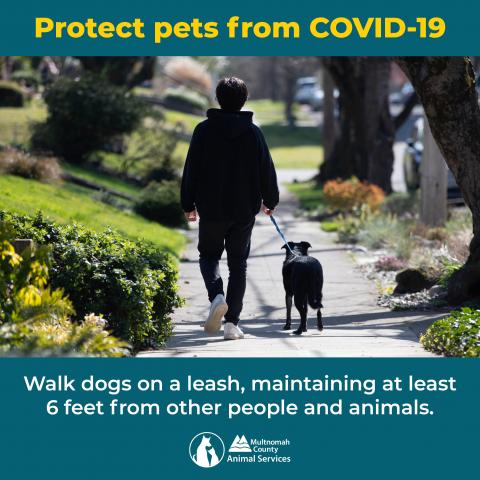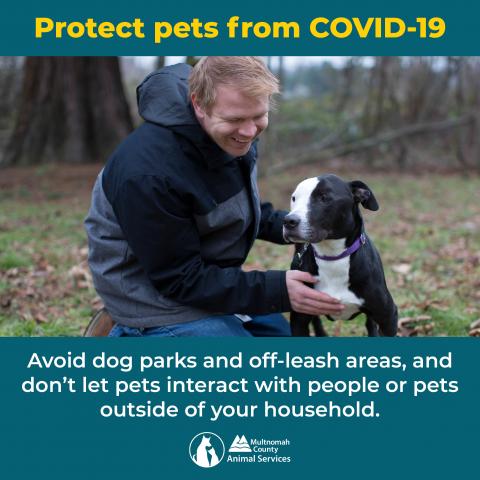Protect Pets and People from COVID-19
Read new guidelines from the CDC for protecting the pets and people of your home, including social-distancing guidelines to prevent the spread of COVID-19, and ways to protect your pets if you are sick.
What You Can Do For Your Pets
The CDC is aware of a small number of pets, including dogs and cats, reported to be infected with the virus that causes COVID-19, mostly after close contact with people with COVID-19. Only a few of the animals reported to be positive showed signs of illness.
Until we learn more about how this virus affects animals, treat pets as you would other human family members to protect them from a possible infection.
- Do not let pets interact with people or other animals outside the household.
- Keep cats indoors when possible to prevent them from interacting with other animals or people.
- Learn about Cats Safe at Home for ways to keep indoor cats safe and happy.
- Walk dogs on a leash, maintaining at least 6 feet (2 meters) from other people and animals.
- Avoid dog parks or public places where a large number of people and dogs gather.
There is a small number of animals around the world reported to be infected with the virus that causes COVID-19, mostly after having contact with a person with COVID-19. Talk to your veterinarian if your pet gets sick or if you have any concerns about your pet’s health.
(Source: CDC Covid-19 Recommendations- If You Have Animals)
Protect Pets If You Are Sick
If you are sick with COVID-19 (either suspected or confirmed by a test), you should restrict contact with your pets and other animals, just like you would with people. Until we know more about this virus, people sick with COVID-19 should avoid contact with pets and other animals.
- When possible, have another member of your household care for your pets while you are sick.
- Avoid contact with your pet, including petting, snuggling, being kissed or licked, and sharing food or bedding.
If you must care for your pet or be around animals while you are sick, wear a cloth face covering and wash your hands before and after you interact with them.
If you are sick with COVID-19 and your pet becomes sick, do not take your pet to the veterinary clinic yourself. Call your veterinarian and let them know you have been sick with COVID-19. Some veterinarians may offer telemedicine consultations or other plans for seeing sick pets. Your veterinarian can evaluate your pet and determine the next steps for your pet’s treatment and care.
For more information visit: What to Do if You are Sick.
(Source: CDC Covid-19 Recommendations- If You Have Animals)
Have a Plan For Pets
Have a plan in place for your pets in an emergency if you are sick or require hospitalization. Who will care for them? Will they have enough food, medication, litter, or other necessary supplies?
To prepare
Identify a family member or friend who can care for your pet if their primary caretakers are ill. This is the most important thing you can do to prepare! Multnomah County Animal Services has limited capacity to care for stray animals, intake is suspended for stray and community cats except cases of sick or injured animals, and emergency boarding is limited to referrals from hospital case workers for critical circumstances, as shelter capacity allows.
- Have crates, food, and extra supplies on hand and ready to go for quick movement of pets.
- Keep all animal vaccines up to date if emergency boarding becomes necessary.
- Ensure all medications are documented with dosages and administering directions. Include veterinary prescriptions if possible.
- Ensure all pets have identification — a collar with the pet license number, and tags with your contact numbers. Microchip your pet, and/or contact your microchip registry to ensure your information is current.





